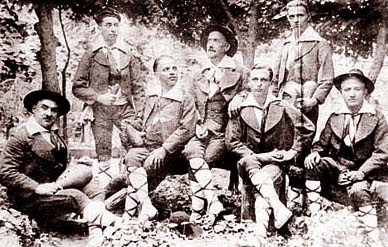
(100 years ago)

The Ensemble Novecento is made up of 7 dedicated and passionate musicians who have researched and re-proposed unjustly forgotten musical repertoires in order to bring them back into the light of our times.
The group is led by Giorgio Pacchion i, Teacher of the recorder at the "Conservatorio G.B. Martini di Bologna", and maker of the handmade copies of the emilian fin de siecle instruments (which have also been used on the record) .
The recently formed Ensemble Novecento, g ives concerts where the (original) musical pieces, typical of early nineteenth century entertainment, are executed with spirit and skill. The ocarina (at the time, a new instrument) performed (new music) lively dances, sonatas, capriccios and va riations and paraphrases of famous tunes.
The Ensemble Novecento has recently recorded a CD named "Il Grillo" [Nt 6726] . Some comments about us are:
..... Con irrefrenabile virtuosismo l'ensemble Novecento fa rivivere il repertorio delle formazioni ocarinistiche in auge a cavallo fra I due secoli.
[Il Manifesto 21 ott. 1995]
... e il travolgente virtuosismo dei suoi sette strumentisti vale a ripetere l'incantesimo: la sublimazione dell'umile materia d'origine [la terracotta] in un suono purissimo .
[Cuore N.195]
..e dell'allegro campionario di Monferrine, Galoppe, Saltarelli, Polke e Mazurke che queste sette terracotte sciorinano con stupefacente disinvoltura e puntuale scrupolo storico .
[Fare musica N. 159]
Autors |
Titles |
Times |
€ |
€ |
€ |
E.W.Link |
Marches des Joyeux Fetards |
0:02:36 |
Anonimo |
Monferrina |
0:01:19 |
A. Barattoni |
Scivolando (polka galop) |
0:02:29 |
Anonimo |
Madama lampo |
0:01:29 |
A, Barattoni |
Non gurdarmi cosi' (mazurka) |
0:03:22 |
G. Rossini |
Cavatina (dal Barbiere di Siviglia) |
0:03:25 |
Anonimo |
Galoppa |
0:01:19 |
C. Avati |
Sonata |
0:02:57 |
G. Grossi |
L'usignolo (polka) |
0:03:00 |
A. Barattoni |
Fiorin di pesco (polka) |
0:02:01 |
Anonimo |
Saltarello bolognese |
0:01:39 |
Baur |
Scappa Scappa! (galop) |
0:04:16 |
L. Gramantieri |
Farfalle nere (valzer) |
0:03:44 |
A. Barattoni |
Il merlo vedovo |
0:02:47 |
Anonimo |
"Capriccio originale" |
0:05:25 |
Anonimo |
Cici Cucù (polka) |
0:02:47 |
G. Pacchioni |
Il grillo (sonata) |
0:02:26 |
| € |
||
| Esecutori |
||
| € |
||
Giorgio Pacchioni |
Ocarina prima in Do, MicrOcarina e Ocarina a doppia voce |
|
Marco Ferrari |
Ocarina seconda in Sol |
|
Piero Callegari |
Ocarina terza in Do |
|
Matteo Rossi |
Ocarina quarta in Sol |
|
Emanuela di Cretico |
Orarina quinta in Do e Usignolo ad acqua |
|
Margherita Degli Esposti |
Ocarina sesta in Sol |
|
Elena Bianchi |
Ocarina settima in Do |
|
The music of the CD "Il Grillo"
The record explores the area of dance - type and entertaining music which was in vogue at the end of the eighteen hundreds and the beginning of the nineteen hundreds.
The first three tracks are part of the old repertoir e (which is actually of the Renaissance) made up of lively dances.
La Monferrina is the name of quite a lively dance which is obviously from Monferrato, hence the name. There are also relevant variations in other areas of the Po valley: M. bolognese. M. modenese, M. di Cereglio etc.
Il Salterello bolognese is like the highland saltarello in 6/8 time. It begins with a round dance and then, following the changes of the tune, the men do three twirls and together with the women a round dance, usually finishing with a trescone.
La Galoppa is a type of dance in quite a fast time and is so-called because, during the dance, the gallop of a horse is imitated.
The Waltz , Polka and Mazurka are the famous paired dances which obliterated the above jumping dances in the first part of our century.
Entertaining music, sonatas. fantasias and transcriptions of
famous tunes. was also a very appreciated type of music.
The authors
The tunes on this CD are from authors who were more or less connected with the ocarina. except. perhaps, for Rossini who didn't see its birth, and two foreign names (Baur and Link) of whom nothing is known in this respect. They range from the earliest, like G. Grossi to later musicians like C. Avati and A. Barattoni until G. Pacchioni who is the conductor and ocarina soloist of the Ensemble Novecento.
These impassioned authors and soloists' compositions are often soaked in onomatopoeic sounds and are, in any case. reminiscent of animal calls. like, for example. the nightingale, the blackbird, the cricket. butterflies and every sort of "cici cucu" that the human imagination can think up. " Capriccio originale ". by Anonymous (perhaps Grossi or A. Mezzetti ), a track which uses the ocarina in quite a virtuosi manner, shows a certain instrumental interest and is surprising in contrast with the simplicity of the instrument itself.
The transcriptions (Rossini, Baur and Link) are, without doubt in line with the popular ideal of the concert which was in vogue in the first decades of this century.